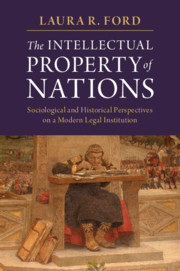 The Intellectual Property of Nations
The Intellectual Property of Nations Book contents
- The Intellectual Property of Nations
- The Intellectual Property of Nations
- Copyright page
- Contents
- Preface and Acknowledgments
- Introduction
- 1 Legal Institutions and Social Power
- 2 Legal Orders and Social Performance
- 3 Instruments of Legal Power in the Roman Republic
- 4 Semantic Legal Ordering
- 5 Cultural Transformations
- 6 Privileges and Immunities in a Sacramentalizing Order
- 7 Administrative Kingship and Covenantal Bonds
- 8 Intellectual Property in a Nationalizing Order
- 9 Cultural Transformations
- 10 Semantic Legal Ordering
- 11 Instruments of Legal Power in the American Republic
- 12 Legal Orders and Social Performance
- Conclusion The Intellectual Property of Nations
- Index
Conclusion - The Intellectual Property of Nations
Published online by Cambridge University Press: 04 June 2021
- The Intellectual Property of Nations
- The Intellectual Property of Nations
- Copyright page
- Contents
- Preface and Acknowledgments
- Introduction
- 1 Legal Institutions and Social Power
- 2 Legal Orders and Social Performance
- 3 Instruments of Legal Power in the Roman Republic
- 4 Semantic Legal Ordering
- 5 Cultural Transformations
- 6 Privileges and Immunities in a Sacramentalizing Order
- 7 Administrative Kingship and Covenantal Bonds
- 8 Intellectual Property in a Nationalizing Order
- 9 Cultural Transformations
- 10 Semantic Legal Ordering
- 11 Instruments of Legal Power in the American Republic
- 12 Legal Orders and Social Performance
- Conclusion The Intellectual Property of Nations
- Index
Summary
This concluding chapter seeks to reiterate themes and lines of argument, while laying a foundation for discussion and judgment about the place of intellectual property in our political communities today. To summarize: the modern nation-state system, powered partly by intellectual property law, is fundamentally an order of obligation, an organization of vast social networks, in which legal instruments with ancient roots performatively link people and organizations together with their national polities into a joint project of economic expansion. The social formation story that I have told in tracing the development of this system is one in which Roman law and Biblical law were drawn together under the authority of bishops and kings to support a very modern, and very strange, adaptation of Abrahamic faith traditions, an adaptation in which faith is placed in legality, and hope is placed innovation. A characteristic set of anxieties accompanies this modern faith tradition, anxieties that our nation will fall behind in the race for innovation, and will lose its fragile position of dominance in a global order of power.
Keywords
- Type
- Chapter
- Information
- The Intellectual Property of NationsSociological and Historical Perspectives on a Modern Legal Institution, pp. 402 - 414Publisher: Cambridge University PressPrint publication year: 2021


